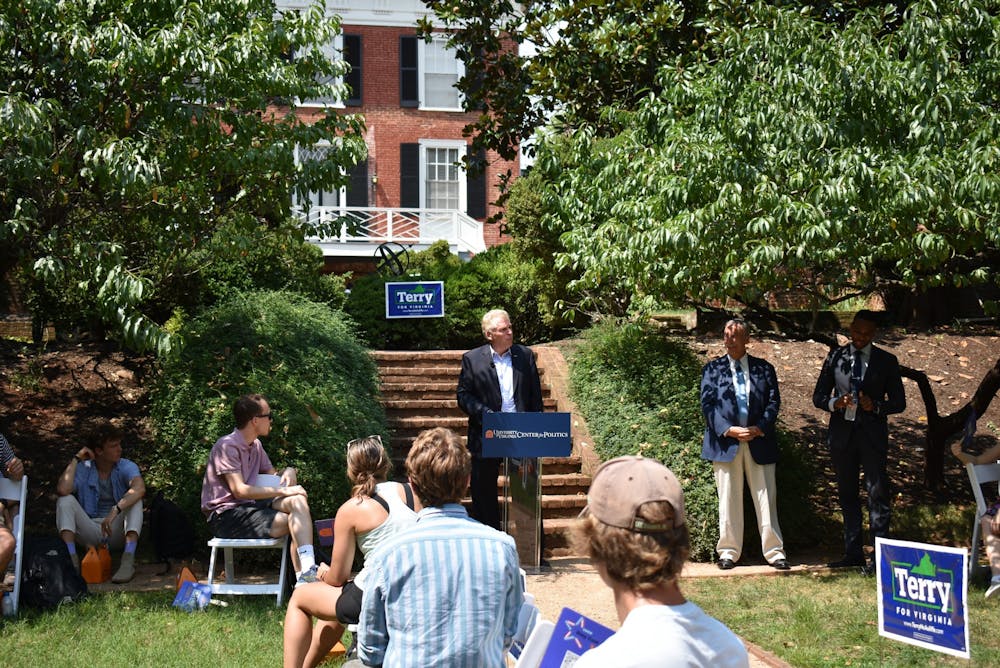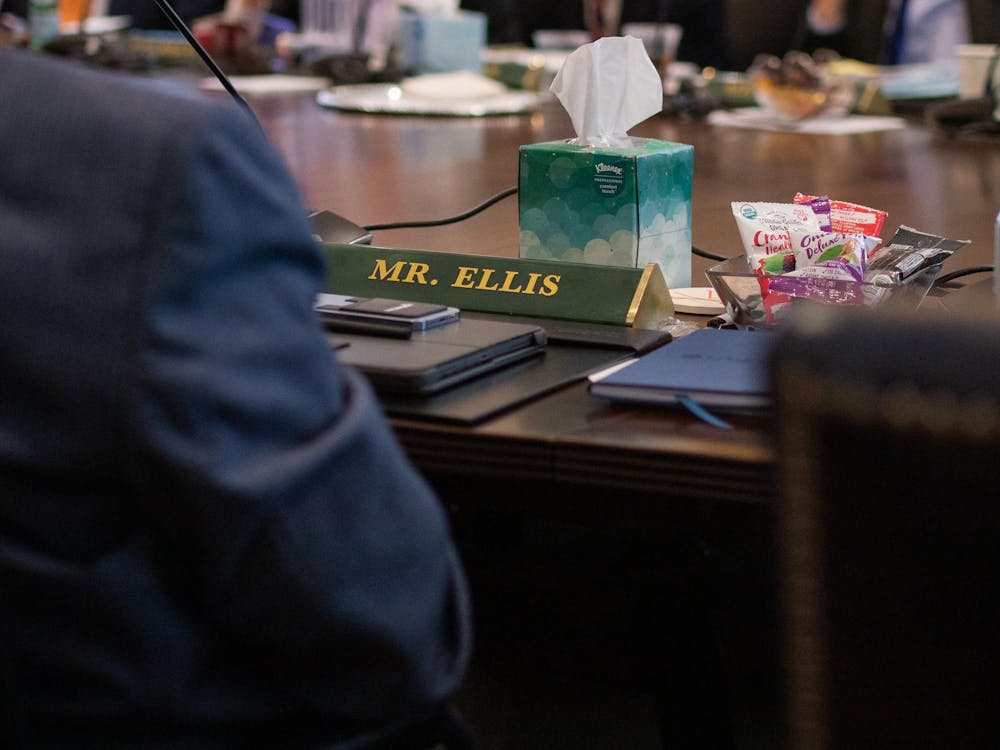Former Democratic Governor Terry McAuliffe visited the University to discuss his current campaign for governor in addition to the importance of requiring vaccines in an event hosted by the Center for Politics Wednesday afternoon. Dr. Cameron Webb — a former Democratic House of Representatives candidate for Virginia’s 5th Congressional District — was also in attendance, along with Board of Visitors member Mark Bowles and vice rector Robert Hardie.
The roughly 45-minute event took place in the gardens of Pavilion IV, attended by approximately 50 students.
The University was McAuliffe’s third college visit in the past 36 hours, having spoken at the College of William and Mary on Tuesday and James Madison University Wednesday morning.
McAuliffe served as the 72nd Governor of Virginia from 2014 to 2018 and is currently in the process of running for his second term, after having to sit out one election cycle due to Virginia laws that prohibit governors from running for consecutive terms. Representing the Democratic Party, McAuliffe will face Republican nominee Glenn Youngkin on the gubernatorial ballot Nov. 2.
Larry Sabato, director of the Center for Politics, introduced McAuliffe, highlighting several achievements made during McAuliffe’s term. During his time as governor, McAuliffe worked to return voting rights to individuals who were ineligible to vote because they had previously been incarcerated.
“One of his proudest accomplishments, and he should be very proud of it, is when he made unprecedented progress on the restoration of civil rights to rehabilitated felons who had completed their sentences,” Sabato said.
This decision restored voting rights to 257,000 Virginians who, eight years ago, were unable to vote. Actions like this, McAuliffe said, are “why politics matter.”
McAuliffe was also influential in creating hundreds of thousands of jobs by expanding Microsoft and bringing companies such as Nestle to Virginia.
As McAuliffe began to speak more specifically about vaccinations, he cited the importance of increasing the vaccinated population as soon as possible as low vaccination numbers could allow more COVID-19 variants to develop — some which could be vaccine resistant. Currently, around 56 percent and 55 percent of Virginia and Charlottesville residents are vaccinated, respectively.
“I have called for all employers to request that all employees get mandated here in the Commonwealth of Virginia,” McAuliffe said. “I've called for every health system in Virginia to make sure that everybody who works in a hospital or health is vaccinated.”
While the University expects professors to be vaccinated, the University Health System announced a new policy Wednesday requiring all of its employees to be fully vaccinated by Nov. 1, or face disciplinary action.
In regards to the large unvaccinated population, Webb — senior policy advisor for equity on the White House COVID-19 response team and the director of health policy and equity at the School of Medicine — explained how it was more acceptable to refrain from getting vaccinated during the period of emergency use authorization. EUAs fast track some aspects of the approval process for vaccinations and medications when there are no other adequate options, allowing doctors and researchers to provide approval based on the best available evidence.
For a portion of the unvaccinated, this allowed for more uncertainty about the safety of the vaccines. The Food and Drug Administration asked to see a minimum of only two months of safety data before clearing the vaccines for emergency use. For full approval, the FDA looked through six months of safety data
However, he said that the recent Food and Drug Administration’s approval of the Pfizer-BioNTechCOVID-19 vaccine on Monday sends a clear message to citizens about the vaccine being safe.
“I think that the first thing is just making sure that people know, yes, you should get vaccinated,” Webb said.
Additionally, Webb believes that the large amount of disinformation about the vaccine that has been circulating has led many to refrain from receiving the shot. This misinformation includes the false idea that microchips are in the vaccine or that the shots can turn someone into a magnet, among broader concerns about the safety of the vaccine.
During the second half of the event, McAuliffe mentioned the importance of communication between the White House and individual states.
“I would have a great working relationship with the federal government working in tandem together,” McAuliffe said.
Towards the end of the speech, McAuliffe emphasized the importance of the Governor’s role in politics and the impact the position can have on citizens. He mentioned, in particular, that governors have an influence on health care, education and infrastructure, including roads. During his term, he was able to stop legislation that would have shut down 16 women’s health clinics and brought 200,000 jobs to the commonwealth.
During a brief question and answer period at the end of the event, third-year College student Booker Johnson asked McAuliffe’s plans to help people understand the importance of mass vaccination as well as how he plans to educate the public on vaccine misinformation.
McAulife responded by emphasizing the importance of vaccination requirements and how his relationship with President Joe Biden and the Centers for Disease Control and Prevention will aid in his ability to mandate vaccines.
“I think that's the point we’ve got to start making to people,” McAuliffe said.
Most students in attendance were unaware that McAuliffe would be speaking in addition to Sabato, including fourth-year College student Shannon Britt.
Britt completed a public policy internship with the Miller Center, through which she received an invitation to this event. She voiced her gratitude for McAuliffe taking time to speak with students.
“It's really great to hear actually more about his agenda and what he plans to do as governor,” Britt said.
Upon entering and leaving the event, attendees were encouraged to register to vote in Charlottesville, given information about voting and encouraged to canvas on behalf of McAuliffe.
McAuliffe is challenging Republican candidate Glenn Youngkin for the Virginia governorship in the Nov. 2 general election.







